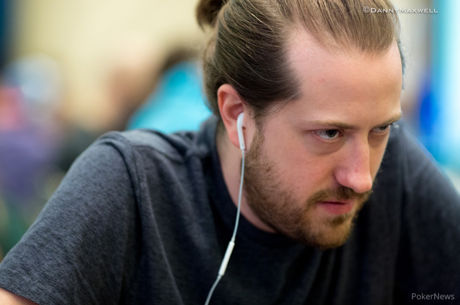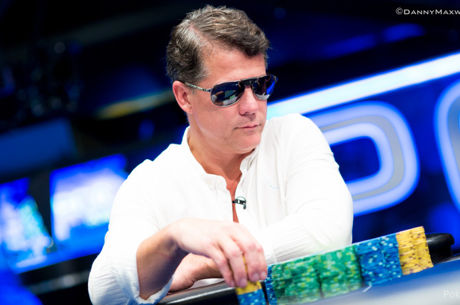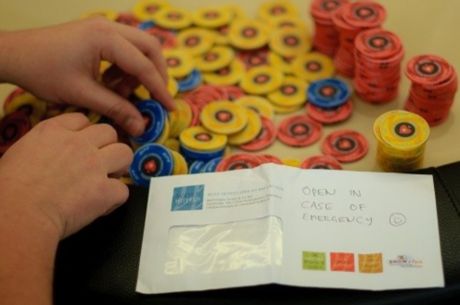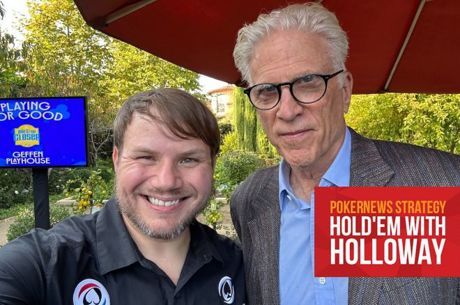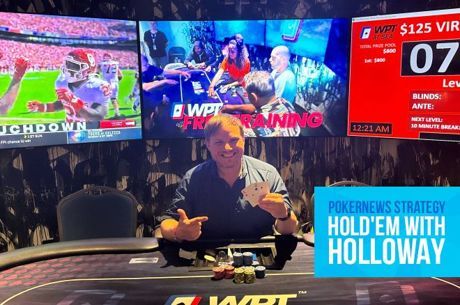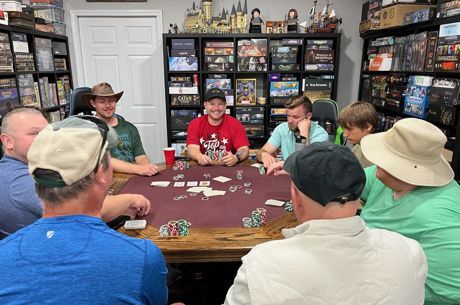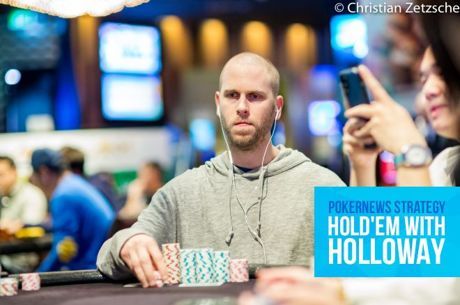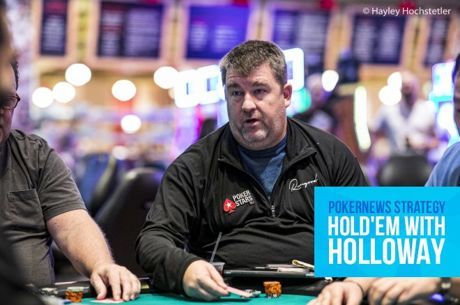Hold’em with Holloway, Vol. 64: Forgetting One Chip -- Should It Still Be an All-In Bet?

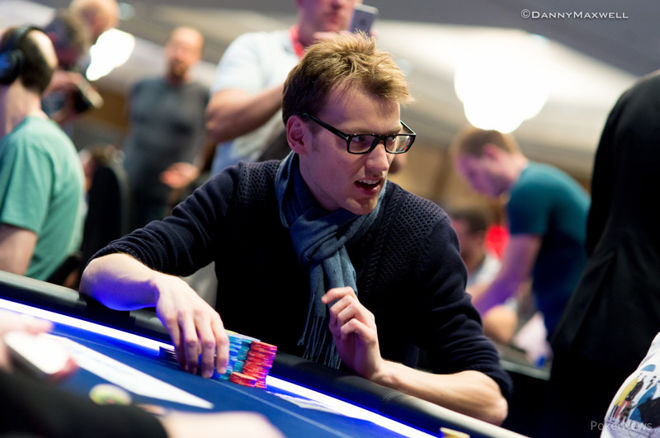
Every once in awhile I witness a tricky tournament situation worth investigating — see last week’s column if you don’t believe me. I examine such situations further not only to familiarize players with various scenarios they may encounter, but also to educate event organizers by giving them the chance to hear what some of the game’s best tournament directors have to say.
This week, I look at a rather innocuous hand from the 2016 PokerStars Caribbean Adventure $100,000 Super High Roller. It happened in Level 4 (1,000/2,000/300) between online star Christoph “Tight-Man1” Vogelsang (pictured above) and 2015 Global Poker Index Player of the Year Byron Kaverman.
It began when Vogelsang raised to 5,200 from the hijack and Kaverman took his time before three-betting to 13,500 from the cutoff. The button and both blinds all folded, Vogelsang thought for nearly two minutes before four-betting to 38,500, and Kaverman thought for an equal amount of time before making the call.

The Q♣Q♦6♥ flop saw Vogelsang think for a while before betting 28,000 and Kaverman tank-called. The time taken for each decision would continue to increase on subsequent streets. For instance, both players checked the 8♥ turn, but not before taking 90 seconds each to do so.
When the 3♦ completed the board on the river, Vogelsang waited nearly two minutes before checking, and Kaverman waited the same before betting 107,000. Vogelsang then paused for another minute before stacking all but one of his chips — a single T100 chip capping his cards — and slid them in for an all-in check-raise to 130,400.
The dealer then instructed him to put in the remaining 100, which brought the total up to 130,500. Kaverman thought for a minute before making the call, and Vogelsang tabled A♣A♥. Kaverman shook his head and showed K♠K♣ before watching the pot pushed to his opponent.
The hand was fairly standard, but I couldn’t help but wonder about that lone chip. Vogelsang didn’t announce that he was all in, and the amount he pushed forward wasn’t technically enough for a raise. Had Kaverman argued it, could it have been interpreted as just a call?

I asked the tournament director, Luca Vivaldi, and he explained that it was clear Vogelsang intended to go all in, so that was how he would have ruled had Kaverman made a big deal out of it. I’m all for rulings based on “the fairness of the game,” and thought that was indeed the right way to interpret the situation.
That said, I have been in plenty of casinos where they are sticklers for the rules, meaning they have no flexibility when it comes to interpretation (I’ve always hated that). So what if this situation happened elsewhere? Would another tournament director rule otherwise?
“I read that and would have considered it a raise and all-in,” noted tournament director Matt Savage told me when I ran the situation by him. “There is no way I would change the action over a single 100 chip being used as a card cap.”
Likewise, Bill Bruce, tournament director for the Hollywood Poker Open, stated that he would have reached the same conclusion had it taken place on his tour.
“It seems pretty clear that he wants to go all in," Bruce explained. "I wouldn’t let the fact that he kept a chip to cap/protect his hand from accidental mucking factor into any decision. This is something that I do also when I go all in, however I verbalize ‘all in.’ After seeing dealers accidentally kill all-in hands — a scenario where the player has no options once his hand is gone — on multiple occasions through the years, I don’t think it’s unreasonable that he did that. It just seems clear to me that he is going all in.”
I know some players who would’ve made a big stink if they were in Kaverman’s shoes, but doing so, while perhaps technically within the rules, would have been in very poor taste. In this situation, where a lowest-denomination chip is left behind as a card protector while the rest of the all-in isn’t enough to constitute a legal raise, it seems most tournament directors agree — the player should be considered all in.
Want to stay atop all the latest in the poker world? If so, make sure to get PokerNews updates on your social media outlets. Follow us on Twitter and find us on both Facebook and Google+!

PR & Media Manager for PokerNews, Podcast host & 2013 WSOP Bracelet Winner.
In this Series
- 1 Hold’em with Holloway, Vol. 1: Making Reads and Trusting Them
- 2 Hold’em with Holloway, Vol. 2: Playing in Poker Charity Events
- 3 Hold’em with Holloway, Vol. 3: Throttle Back Before You End Up Punting
- 4 Hold’em with Holloway, Vol. 4: Punish the Satellite Bubble
- 5 Hold’em with Holloway, Vol. 5: What is Proper Accumulator Strategy?
- 6 Hold’em with Holloway, Vol. 6: A Chip and a Chair Story with “SirWatts”
- 7 Hold’em with Holloway, Vol. 7: 15 Things About Poker I Wish I’d Known Sooner
- 8 Hold’em with Holloway, Vol. 8: Examining the Largest Overlay in Poker History
- 9 Hold’em with Holloway, Vol. 9: Differences Between Rebuys and Reentries
- 10 Hold’em with Holloway, Vol. 10: Five Must-Read Poker Books of 2014
- 11 Hold’em with Holloway, Vol. 11: When Will You Finally Break Through?
- 12 Hold’em with Holloway, Vol. 12: Dealing with a Target on Your Back
- 13 Hold’em with Holloway, Vol. 13: Knowing When to Call It Quits
- 14 Hold’em with Holloway, Vol. 14: Embarking on a Year-Long Weight Loss Journey
- 15 Hold’em with Holloway, Vol. 15: Navigating Multiple Decision Points in a Poker Hand
- 16 Hold’em with Holloway, Vol. 16: Chris Moorman Tells Me How Badly I Play Poker
- 17 Hold’em with Holloway, Vol. 17: Richard “nutsinho” Lyndaker on Getting It in Marginal
- 18 Hold’em with Holloway, Vol. 18: Getting Inside the Head of Poker Pro Brian Rast
- 19 Hold’em with Holloway, Vol. 19: Stupid Calls & Lucky Draws in MSPT WI Championship
- 20 Hold’em with Holloway, Vol. 20: Talking Ante-Only Strategy with Greg “FossilMan” Raymer
- 21 Hold’em with Holloway, Vol. 21: Contributing to Jonathan Little’s New Book
- 22 Hold’em with Holloway, Vol. 22: Consequences of Acting Out of Turn & Tossing in Chips
- 23 Hold’em with Holloway, Vol. 23: When It Comes to Chops, Do What’s In Your Best Interest
- 24 Hold’em with Holloway, Vol. 24: Accepting Bad Beats & Lessons in Selling Action
- 25 Hold’em with Holloway, Vol. 25: Heinz’ Ace-High Call Shows Why He's a World Champ
- 26 Hold’em with Holloway, Vol. 26: Is Keeping the Short Stack Alive Collusion?
- 27 Hold’em with Holloway, Vol. 27: Great Laydown or Bad Fold on Poker Night in America?
- 28 Hold’em with Holloway, Vol. 28: Calling Hellmuth with Jack-Deuce Offsuit
- 29 Hold’em with Holloway, Vol. 29: The Philosophy of "No-Chop" Chad
- 30 Hold’em with Holloway, Vol. 30: Preparing to Play the World Series of Poker
- 31 Hold’em with Holloway, Vol. 31: Staying on Your Grind at the World Series of Poker
- 32 Hold’em with Holloway, Vol. 32: The Perilous Decision to Call Off with Ace-Queen
- 33 Hold’em with Holloway, Vol. 33: Using Poker Skills in Reality TV Competitions
- 34 Hold’em with Holloway, Vol. 34: Esfandiari Explains How to Recover from Bad Beats
- 35 Hold’em with Holloway, Vol. 35: Tilly vs. Brunson in Super High Roller Cash Game Hand
- 36 Hold’em with Holloway, Vol 36: Unconventional Play Leads to Good WSOP Main Event Start
- 37 Hold’em with Holloway, Vol. 37: Lessons in Pot-Limit Omaha Hi-Low w/ Evan Jarvis
- 38 Hold’em with Holloway, Vol. 38: Things to Say and Do When You Bust a Poker Tournament
- 39 Hold’em with Holloway, Vol. 39: How Much Did I Have to Raise to Get You to Fold?
- 40 Hold’em with Holloway, Vol. 40: Practicing Patience in My Deep PPC Poker Tour Run
- 41 Hold’em with Holloway, Vol. 41: Analyzing a Questionable SHRPO Main Event Hand
- 42 Hold’em with Holloway, Vol. 42: Analyzing the Play of Neymar Jr. at EPT Barcelona
- 43 Hold’em with Holloway, Vol. 43: The Value of a Reliable Poker Reputation
- 44 Hold’em with Holloway, Vol. 44: John “KasinoKrime” Beauprez Rips My PLO Game Apart
- 45 Hold’em with Holloway, Vol. 45: Satellite Dilemmas -- To Call or Not to Call
- 46 Hold’em with Holloway, Vol. 46: Seiver Leverages the River in Super High Roller Bowl
- 47 Hold’em with Holloway, Vol. 47: What Untraditional Moves in Poker Might Mean
- 48 Hold’em with Holloway, Vol. 48: Thinking About the Future with Sam Grizzle
- 49 Hold’em with Holloway, Vol. 49: WCOOP Champ “Coenaldinho7” Offers Up His Biggest Hands
- 50 Hold’em with Holloway, Vol. 50: The Peril of Shoving Weak Aces
- 51 Hold’em with Holloway, Vol. 51: The Importance of Not Giving Up in Poker Tournaments
- 52 Hold’em with Holloway, Vol. 52: Does Asking “Check” Actually Constitute a Check?
- 53 Hold’em with Holloway, Vol. 53: Thomas Cannuli Impresses Even After Main Event Bustout
- 54 Hold’em with Holloway, Vol. 54: Dealers Aren’t Always Right
- 55 Hold’em with Holloway, Vol. 55: Don’t Get Married to Pocket Aces
- 56 Hold’em with Holloway, Vol. 56: Bazeley’s Survival Instinct Leads to Continued Success
- 57 Hold’em with Holloway, Vol. 57: Playing “Deuces Wild” on the European Poker Tour
- 58 Hold’em with Holloway, Vol. 58: The Wildest Hand in European Poker Tour History
- 59 Hold’em with Holloway, Vol. 59: Death, Zombies & Spending Time w/Phil Hellmuth
- 60 Hold’em with Holloway, Vol. 60: How the Unstoppable Fedor Holz Managed to Win Again
- 61 Hold’em with Holloway, Vol. 61: Lessons To Be Learned When You Hit the Big Stage
- 62 Hold’em with Holloway, Vol. 62: Steve O’Dwyer Explains the “Oreo Cookie Tell”
- 63 Hold’em with Holloway, Vol. 63: What Would Happen to a Chip Stack If a November Niner Died?
- 64 Hold’em with Holloway, Vol. 64: Forgetting One Chip -- Should It Still Be an All-In Bet?
- 65 Hold’em with Holloway, Vol. 65: Todd “sharkslayerrr” Breyfogle on Bankroll Management
- 66 Hold’em with Holloway, Vol. 66: Cash Game Pro Daniel Arfin Offers Sound Bankroll Advice
- 67 Hold’em with Holloway, Vol. 67: Honeyman Plays Kings to Keep in Opponent’s Bluff Range
- 68 Hold’em with Holloway, Vol. 68: Why Do I Even Bother Drinking at the Poker Table?
- 69 Hold’em with Holloway, Vol. 69: Is Your Favorite Poker Pro Left- or Right-Handed?
- 70 Hold’em with Holloway, Vol. 70: In Order to Live You Have to Be Willing to Die
- 71 Hold’em with Holloway, Vol. 71: How to Amass a Big Stack Early in a Poker Tournament
- 72 Hold’em with Holloway, Vol. 72: Answering User-Submitted Poker Scenarios
- 73 Hold’em with Holloway, Vol. 73: Saying Goodbye with a Top Five List
- 74 Hold'em with Holloway, Vol. 74: We're Back, Baby!
- 75 Hold'em with Holloway, Vol. 75: Jivkov on Exploiting Capped Ranges
- 76 Hold’em with Holloway, Vol. 76: Matt Bretzfield Gets Tricky With Aces
- 77 Hold'em with Holloway, Vol. 77: Joseph Cheong Gets Crazy with a Pair of Ladies
- 78 Hold'em with Holloway, Vol. 78: Wyoming Poker Action & Wild South Dakota Hand
- 79 Hold'em with Holloway, Vol. 79: Calling Controversy at WinStar
- 80 Hold'em with Holloway, Vol. 80: Going for Value with Matt Hunt
- 81 Hold'em with Holloway, Vol. 81: Bracelet Winner Ryan Leng on Bad Call
- 82 Hold'em with Holloway, Vol. 82: Romeopro33 Recounts XL Eclipse Victory
- 83 Hold'em with Holloway, Vol. 83: Men The Master Doesn't Get Paid
- 84 Hold'em with Holloway, Vol. 84: Harman Hits Back-to-Back Miracle Turns
- 85 Hold'em with Holloway, Vol. 85: Jamie Kerstetter on Dealing with Bounties
- 86 Hold'em with Holloway, Vol. 86: Matt Stout Develops a Limp Dynamic
- 87 Hold'em with Holloway, Vol. 87: Matt Alexander Caught in Between w/ Two Red Aces
- 88 Hold'em with Holloway, Vol. 88: John Beauprez on Why He Folded a Set of Jacks
- 89 Hold'em with Holloway, Vol. 89: Alex Aqel Lets Opponent Hang Himself with Aces
- 90 Hold'em with Holloway, Vol. 90: David Peters Makes Beastly Call Against Will Givens
- 91 Hold'em with Holloway, Vol. 91: Poker Lessons from a Game of Risk
- 92 Hold'em with Holloway, Vol. 92: My Upstuck Diagnosis by the CLC Squad
- 93 Hold'em with Holloway, Vol. 93: Alex Foxen Coolers Nick Petrangelo in SHRB
- 94 Hold'em with Holloway, Vol. 94: My $25,000 PSPC Experience at 2019 PCA
- 95 Hold'em with Holloway, Vol. 95: The Equity of Leveraging Time Extensions
- 96 Hold'em with Holloway, Vol. 96: Dan O'Brien on Developing Healthy Routines
- 97 Hold'em with Holloway, Vol. 97: Big Hands From the WSOP-C Potawatomi
- 98 Hold'em with Holloway, Vol. 98: Simon Deadman Rips Apart My NLH Tourney Play
- 99 Hold'em with Holloway, Vol. 99: Shoving 10-6 Smack Dab Into Pocket Aces
- 100 Hold'em with Holloway, Vol. 100: The Revived Re-Entries Debate
